The Hindu Editorial (Fiscal battle) – Apr 04, 2024
To read this article, click “The Hindu”.
This preview is provided here with permission.
Courtesy: The Hindu
The Hindu Editorial (Fiscal battle) – Apr 04, 2024:
- fiscal (adjective) – relating to government money or public money, especially taxes; financial, monetary.
- borrowing (noun) – In finance and economics, borrowing generally refers to receiving money. In simple terms, borrowing can be illustrated as the act of receiving a certain amount of money with the intention that the receiver will have to return the same amount of money after a fixed span of time.
- suit (noun) – court case, lawsuit, trial, litigation, legal proceedings, legal action.
- curtail (verb) – decrease, lessen, reduce, restrict, limit.
- bench (noun) – a court of law with a number of judges.
- Constitution Bench (noun) – a bench of the Supreme Court having five or more judges on it. These benches are not a routine phenomenon. Constitution Benches are exceptions, set up only if some circumstances exist).
- Division Bench (noun) – a bench of two or three judges is called a division bench.
- welcome (adjective) – pleasing, agreeable, favourable, promising, much needed.
- development (noun) – incident, event, occurrence, happening, phenomenon, situation, turn of events,.
- grant (verb) – give, provide, present.
- interim (adjective) – provisional, temporary, short-term, transitional.
- imposition (noun) – enforcement.
- referral (noun) – reference, transfer, passing on, handover (a matter for decision or consideration to some authority).
- opportunity (noun) – chance, possibility, option.
- extent (noun) – ambit, level, scope, range, degree.
- regulate (verb) – control.
- litigation (noun) – legal action, lawsuit, legal case.
- much more (phrase) – a lot more.
- tussle (noun) – fight, clash, quarrel, argument, contention.
- charge (noun) – accusation, allegation, blame.
- mismanagement (noun) – maladministration, misconduct, malpractice, dereliction, mishandling.
- fiscal mismanagement (noun) – fiscal mismanagement, deliberately or not, is handled in a way that can be characterized as “wrong, bad, careless, inefficient or incompetent” and that will reflect negatively upon the financial standing.
- regime (noun) – government.
- recognise (verb) – acknowledge, accept, admit, realize, be conscious of, be aware of.
- constitutional (adjective) – legal, lawful, legitimate, rightful.
- apparent (adjective) – evident, noticeable, visible, obvious, striking.
- conflict (noun) – dispute, quarrel, disagreement, difference of opinion, friction,
- maintain (verb) – continue, carry on, sustain, preserve.
- on the one hand (phrase) – it is used to introduce the first of two contrasting different, points, facts, or ways of looking at something. It is always followed later by “on the other hand” or ‘on the other’.
- move (noun) – action, act, step, measure.
- undermine (verb) – weaken, subvert, sabotage, damage.
- fiscal space (noun) – it is commonly defined as the budgetary room that allows a government to provide resources for public purposes without undermining fiscal sustainability.
- at the heart of (phrase) – be the most important part of something; at the centre of.
- Article 293 of the Constitution of India (noun) – it deals with “Borrowing by States”.
- confer (verb) – grant, give, present, endow, vest in.
- executive (adjective) – relating to a branch of government which enforces the law as written by the legislature and interpreted by the judiciary.
- executive power (noun) – it broadly consists of the power to manage public affairs and to implement the law.
- prescribe (verb) – determine, specify, lay down, stipulate, establish, formulate.
- legislature (noun) – law-making body or governing body; parliament, congress, assembly.
- the legislature (noun) – the House; a deliberative body of persons, usually elective, who are empowered to make, change, or repeal the laws of a country or state. India follows a bicameral (two chambers/parts) system at both the centre and state level.
- extend (verb) – give, offer, grant, present, confer, bestow, hold out.
- consent (noun) – approval, acceptance, agreement, assent, concurrence.
- outstanding (adjective) – unpaid, unsettled, payable, overdue, in arrears, in the red.
- contend (verb) – state, indicate, profess, argue, claim, assert, profess.
- state-owned (adjective) – operated/run by the government.
- enterprise (noun) – organization, undertaking, business, company.
- liabilities (noun) – financial liability, indebtedness, financial obligation, arrears; (an obligation pay money to another party).
- public account (noun) – Article 266 of the Constitution defines the Public Account as being those funds that are received on behalf of the Government of India. Money held by the government in a trust — such as in the case of Provident Funds, Small Savings collections, income of government set apart for expenditure on specific objects like road development, primary education, reserve/special Funds, etc. — are kept in the Public Account. These funds do not belong to the government.
- Net Borrowing Ceiling (NBC) (noun) – The NBC imposes a limitation on borrowings of a State from all sources including open market borrowings. The NBC for States is fixed at 3% of the Gross State Domestic Product (GSDP) or ₹8,59,988 crore in absolute terms for the Financial Year (FY) 2023-24 as recommended by the 15th Finance Commission.
- quantify (verb) – measure the quantity of.
- projected (adjective) – estimated, expected, calculated, predicted.
- Gross State Domestic Product (GSDP) (noun) – it is defined as a measure, in monetary terms, of the volume of all goods and services produced within the boundaries of the State during a given period of time, accounted without duplication.
- Fiscal Responsibility and Budget Management (FRBM) Act (2003) (noun) – Fiscal Responsibility and Budget Management (FRBM) Act enacted in 2003 by the parliament, establishes financial discipline to reduce fiscal deficit. The FRBM Act aims to introduce transparency in India’s fiscal management systems. The Act’s long-term objective is for India to achieve fiscal stability and to give the Reserve Bank of India (RBI) flexibility to deal with inflation in India. The FRBM Act was enacted to introduce more equitable distribution of India’s debt over the years.
- fiscal responsibility (noun) – the act of creating, optimizing and maintaining a balanced budget.
- cap (noun) – limit, ceiling, upper limit, limitation.
- government debt/public debt/sovereign debt (noun) – it represents the total outstanding debt (bonds and other securities) of a country’s central government.
- debt (noun) – liability, financial obligation, borrowed capital.
- Gross domestic product (GDP) (noun) – a measure of economic activity in a country. It is the total value of a country’s annual output of goods and service.
- off-budget (adjective) – not included in the regular government budget.
- bypass (verb) – elude, avoid, dodge, escape, sidestep, evade, circumvent, be evasive about.
- ceiling (noun) – limit, cap, upper limit, limitation.
- claim (verb) – state, allege, argue, contend, assert.
- spillover (noun) – consequence, outcome, repercussion (an unexpected one).
- crowd out (phrasal verb) exclude, oust, overthrow, remove someone from a place by taking their space
- penalise (verb) – punish, discipline, mete out punishment to
- social indicators (noun) – social indicators are set of indicators that measure progress towards the policy objectives designed for promoting employment, combating poverty, improving living and working conditions, combating exclusion, developing human resources, etc.
- It is no surprise that (phrase) – as expected.
- social advancement (noun) – it refers to bringing about improvement in the lives of individuals or groups belonging to underprivileged and vulnerable sections of the society.
- subsume (verb) – include, incorporate, absorb, encompass.
- proceeds (noun) – the amount of money received from an event/activity or from the sale of goods or services; income, revenue, profit, earnings, returns, gains.
- hold to (phrasal verb) –force someone to comply with a commitment/obligation.
- fiscal obligation (noun) – financial obligation, debt, liability, borrowed capital.
- violate (verb) – contravene, offend, break, breach, encroach on, trespass on, infringe on, obtrude on.
- federal (adjective) – relating to a system of government in which establishments such as states or provinces share power with a national government.
- norm (noun) – standard, convention, regulation.
Note :
1. Click each one of the words above for their definition, more synonyms, pronunciation, example sentences, phrases, derivatives, origin and etc. from http://www.oxforddictionaries.com/.
2. Definitions (elementary level) & Synonyms provided for the words above are my personal work and not that of Oxford University Press. Tentative definitions/meanings are provided for study purposes only and they may vary in a different context.
3. This word list is for personal use only. Reproduction in any format and/or Commercial use of it is/are strictly prohibited.
The Hindu Editorial (Fiscal battle) – Apr 04, 2024:
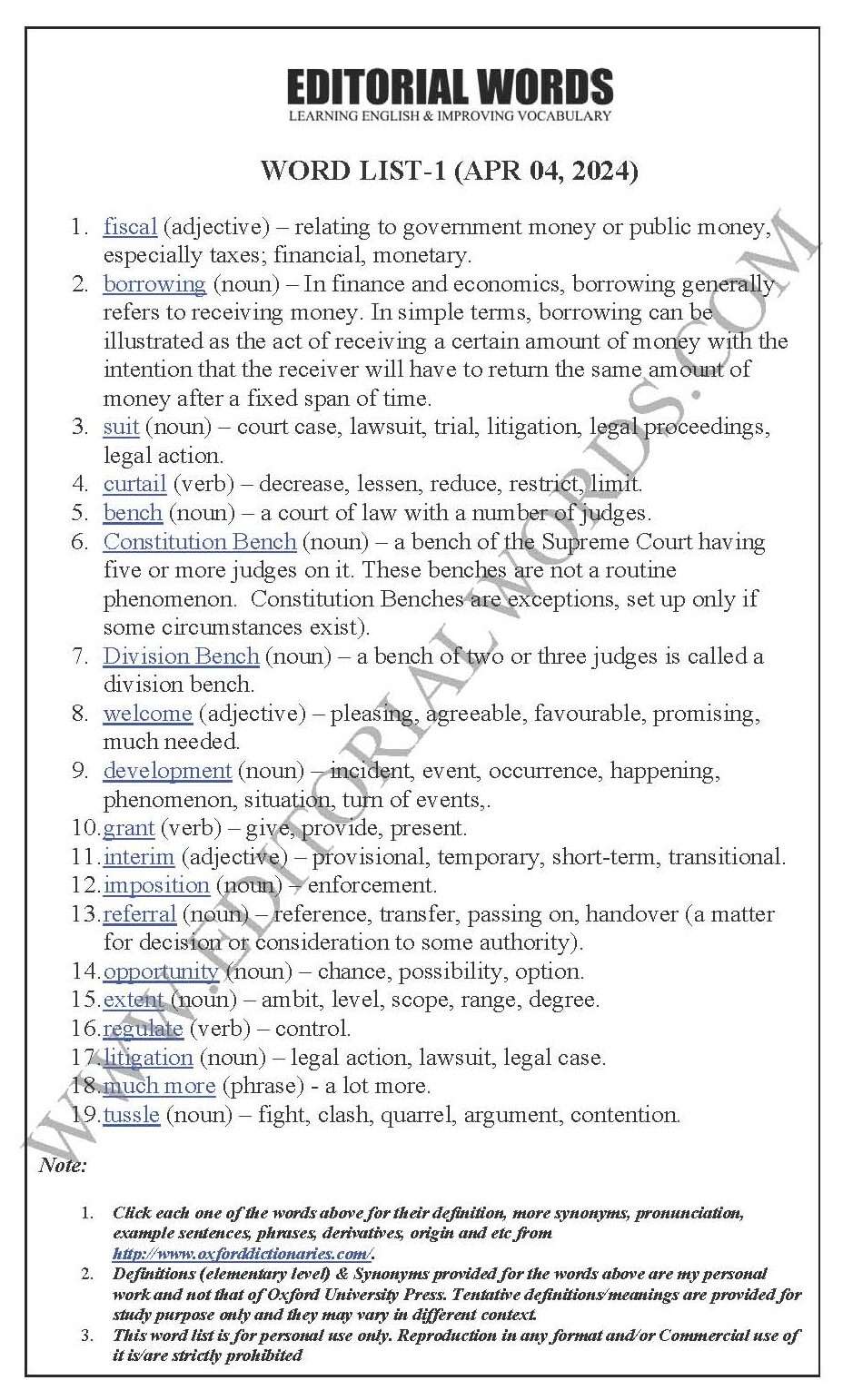
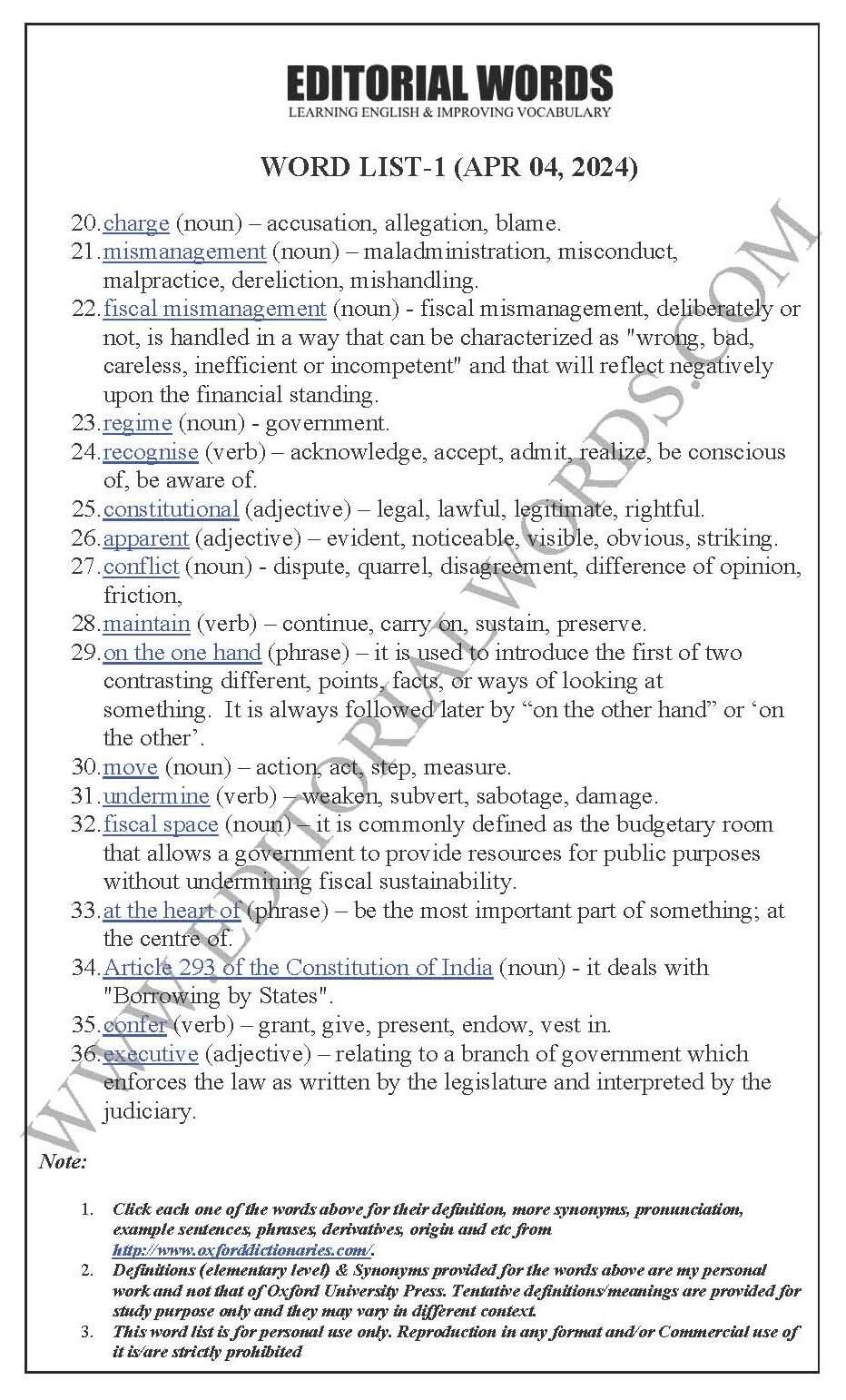
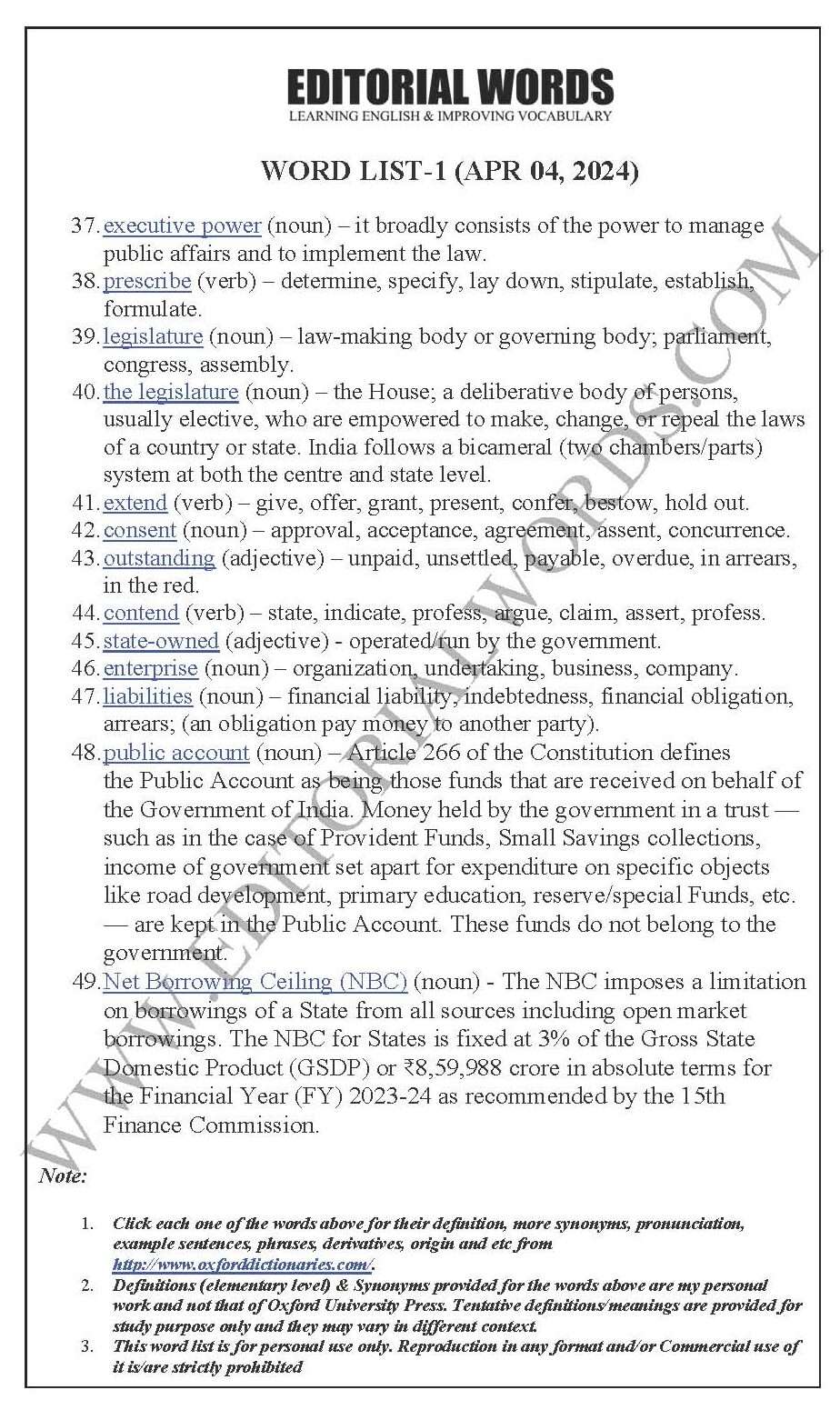
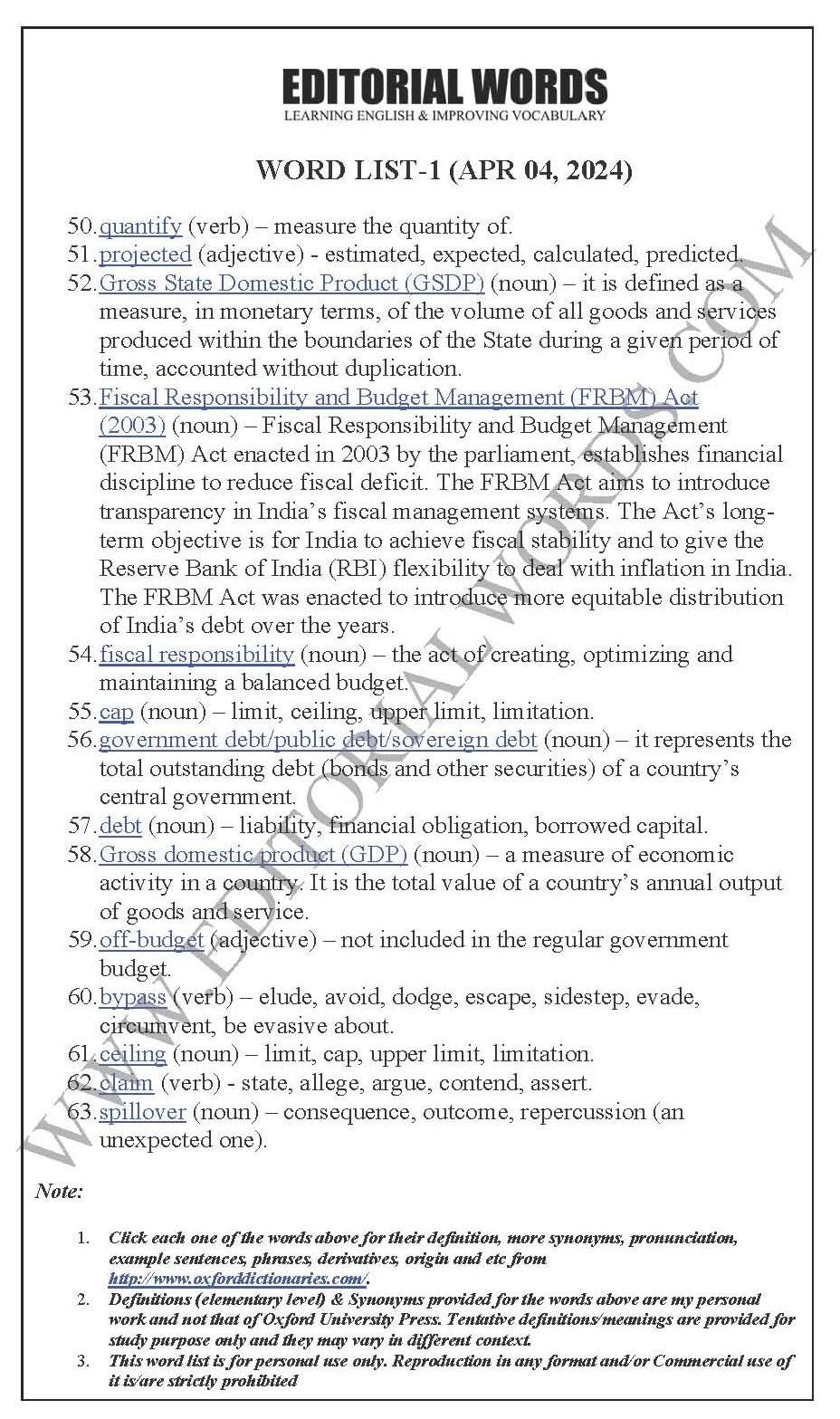
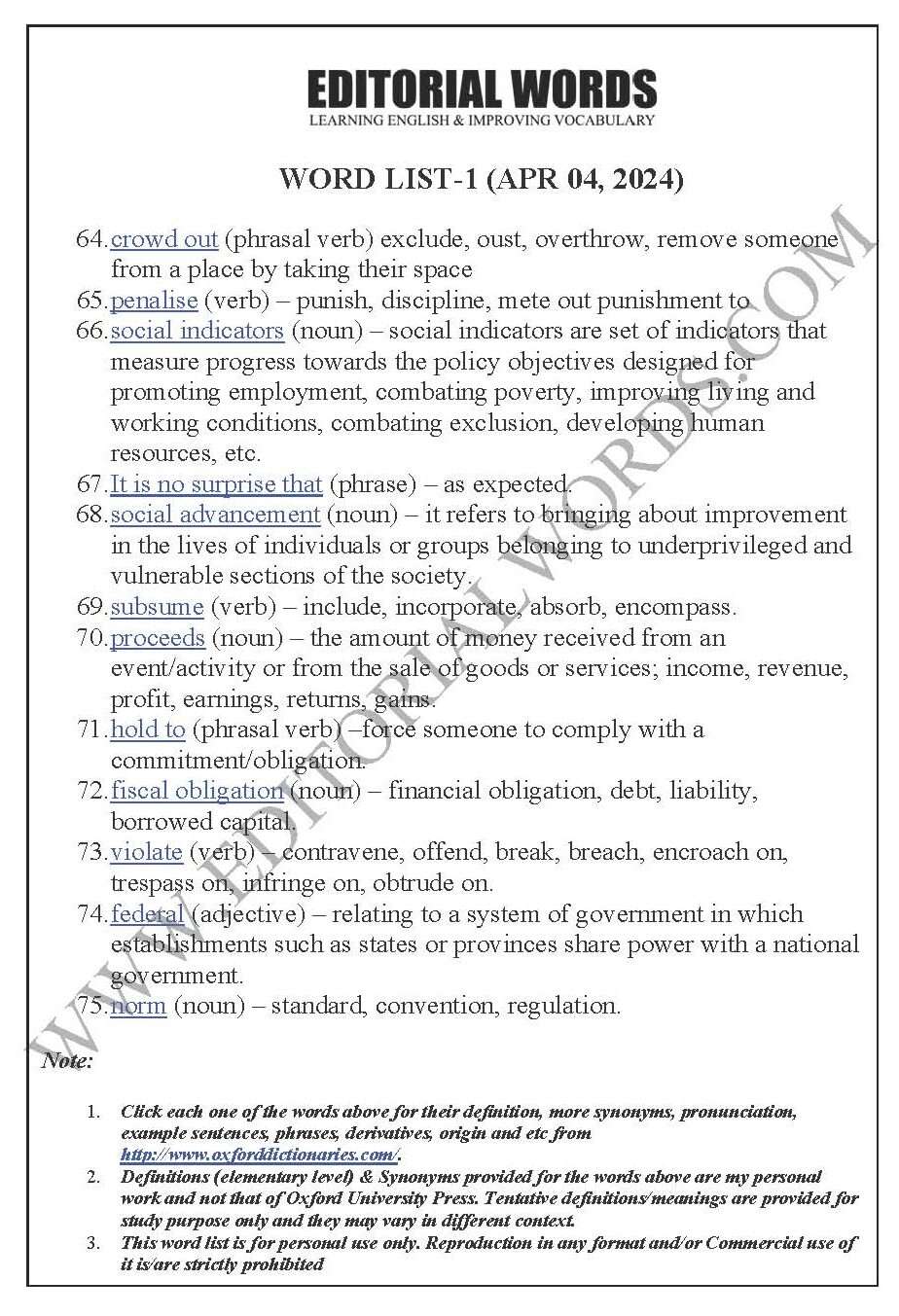
“Phrasal Verbs” We Learnt Last Week
“Idioms & Phrases” We Learnt Last Week
“Important Definitions” We Learnt Last Week
Recent Word Lists For The Hindu Editorial Articles

The Supreme Court of India order referring a suit filed by Kerala, challenging the Centre’s decisions curtailing its borrowings, to a Constitution Bench is a welcome development… For further reading, visit “The Hindu”. Below is today’s word list-1 for The Hindu Editorial (Fiscal battle) – Apr 04, 2024.